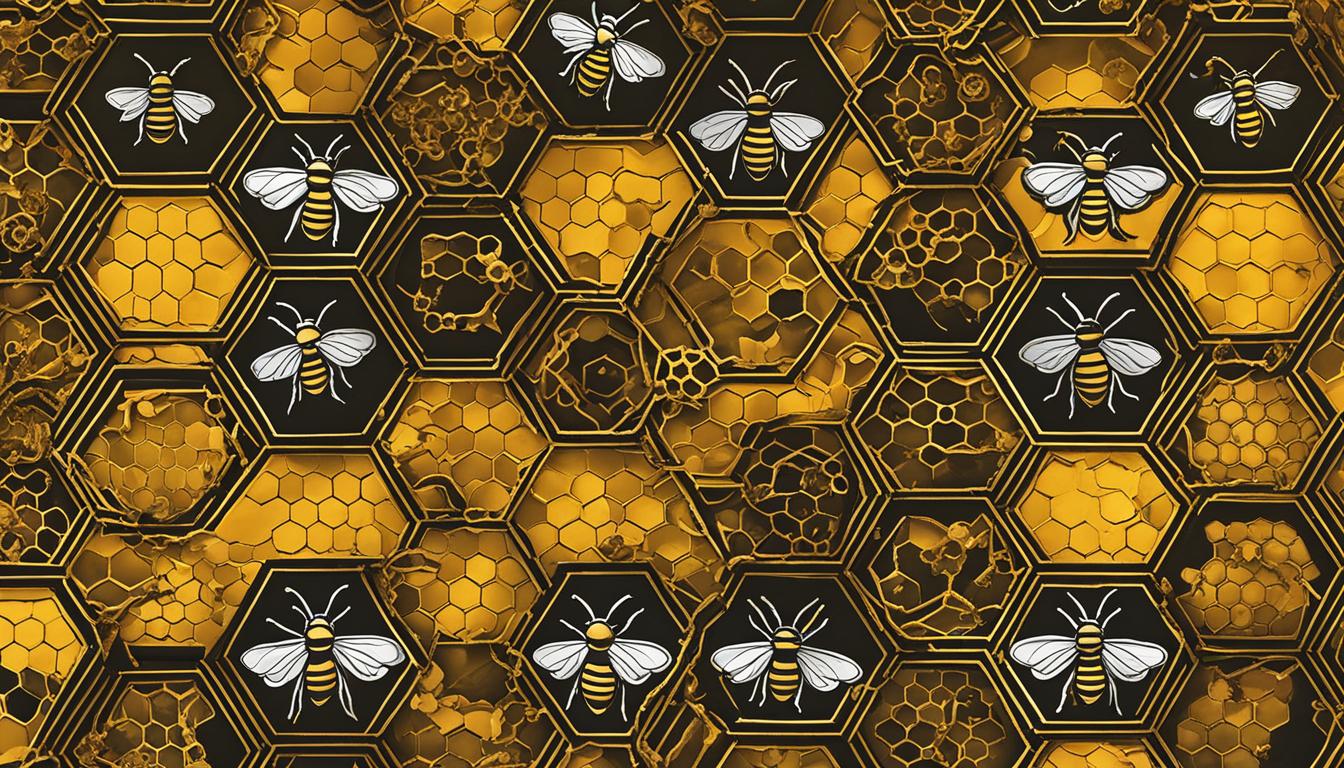Originally posted on January 1, 2024 @ 5:29 am
Bees have long been regarded as symbols of good luck and fortune across different cultures throughout history. They hold a special place in mythology, religion, and superstitions, representing wisdom, love, fertility, and prosperity. From ancient Egypt to ancient Greece, bees have played significant roles in cultural traditions, symbolizing messengers, knowledge, and industry.
In ancient Egypt, bees were believed to be connected to the sun god Ra and associated with birth, death, and resurrection. In ancient Greece, they were linked to nymphs and considered supporters of eloquence and songs. In Christianity, bees were seen as symbols of unselfishness, cleanliness, courage, wisdom, and spirituality. They have also been associated with saints such as Saint Ambrose, Saint Bernhard of Clairvau, and Saint Valentine.
In folklore, bees landing on specific body parts or entering a house were believed to bring good luck and success. They were considered part of the family, and it was customary to inform them about significant events. Bees have long been seen as favorable creatures, with their presence often considered a positive omen.
Key Takeaways:
- Bees have been regarded as symbols of good luck and fortune in various cultures.
- They have played important roles in mythology, religion, and superstitions.
- In ancient Egypt, bees were associated with the sun god Ra and connected to birth, death, and resurrection.
- Ancient Greece linked bees to nymphs and considered them supporters of eloquence and songs.
- In Christianity, bees were seen as symbols of unselfishness, cleanliness, courage, wisdom, and spirituality.
Bees as a Wealth Symbol
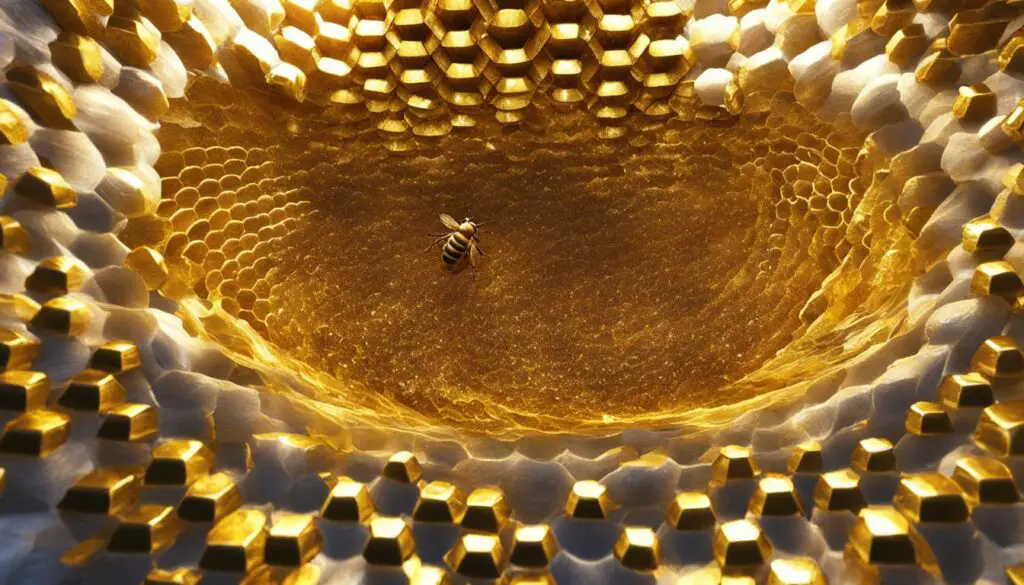
Bees have long been regarded as more than just insects buzzing around. They are seen as powerful symbols of good luck and prosperity, especially when it comes to wealth. The association between bees and productivity, coupled with their industrious nature, has cemented their reputation as bringers of financial success.
Throughout history, charms and coins in the shape of honey bees or adorned with bee symbols have been revered for their ability to attract wealth and prosperity. When these charms are made of gold, their power is believed to be even stronger. The golden hue of beeswax and honey, both products of bees, further bolsters the connection between bees and abundance.
When bees are seen as a symbol of wealth, they become more than just insects. They represent the rewards of hard work, dedication, and perseverance. The diligence and efficiency with which bees go about their tasks are qualities that individuals and businesses strive to emulate in their pursuit of financial success.
Just as bees tirelessly gather nectar to create honey, individuals can harness the energy of bees to attract prosperity and create a thriving financial future. By recognizing the symbolism of bees as a wealth symbol, one can tap into their industrious nature and use it as a guiding principle in their financial endeavors.
The Benefits of Bees as a Sign of Luck:
- Attraction of Wealth: Bees are believed to bring good fortune and financial success to individuals and businesses.
- Associated with Productivity and Industry: Bees’ diligent work ethic is seen as a positive characteristic that can inspire individuals to strive for success.
- Charms and Coins: Honey bee charms and coins, especially those made of gold, are considered potent symbols of attracting wealth and prosperity.
- Connection to Abundance: Beeswax and honey, both products of bees, are associated with richness and abundance, reinforcing the connection between bees and prosperity.
By recognizing bees as a wealth symbol, individuals can tap into the positive energy and luck they represent. Incorporating the symbolism of bees into personal and professional lives can serve as a constant reminder of the importance of productivity, industry, and the rewards that come with working diligently towards financial success.
“Just as bees work together harmoniously for the greater good of the hive, embracing their symbolism can inspire collaboration, abundance, and ultimately, financial prosperity.”
Wealth Symbolism of Bees
| Benefit | Description |
|---|---|
| Attracting Wealth | Bees are believed to bring good fortune and financial success to individuals and businesses. |
| Symbol of Productivity and Industry | Bees’ diligent work ethic is seen as a positive characteristic that can inspire individuals to strive for success. |
| Powerful Charms and Coins | Honey bee charms and coins, especially those made of gold, are considered potent symbols of attracting wealth and prosperity. |
| Connection to Abundance | Beeswax and honey, both products of bees, are associated with richness and abundance, reinforcing the connection between bees and prosperity. |
Bee Superstitions
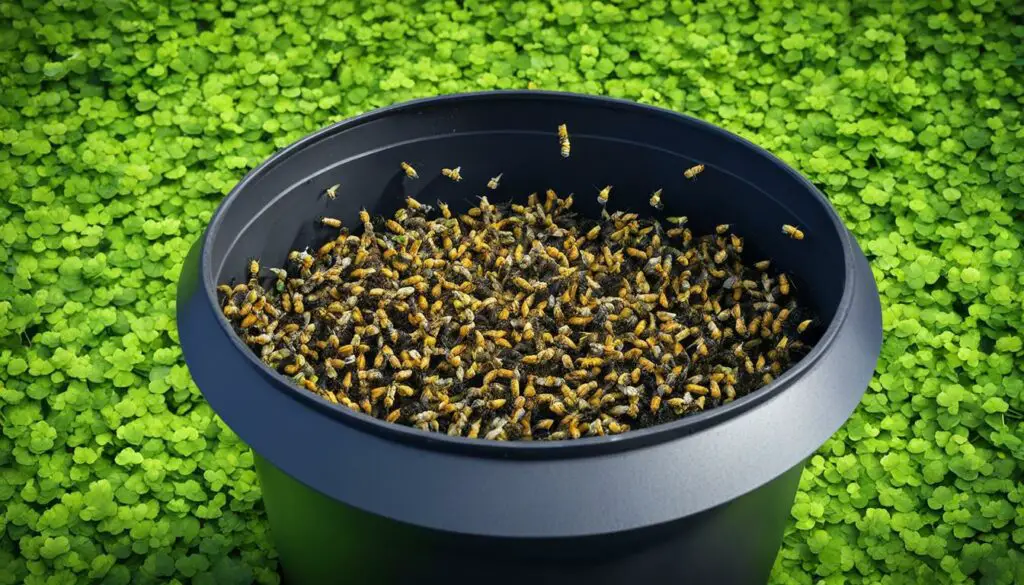
Bees have long been the subject of various superstitions surrounding luck and fortune. These beliefs highlight the positive association between bees and good fortune, with several lucky omens associated with these buzzing creatures.
If a bee lands on your hand…
It is considered a sign of good luck and is believed to herald the arrival of money. So, if you find a bee landing on your hand, you can consider yourself fortunate and anticipate financial blessings coming your way.
When a bee lands on your head…
It is seen as a congratulatory gesture and a harbinger of great success. So, if you ever feel a gentle touch on your head and notice a bee perching there, it’s a positive omen signaling achievements and triumphs on your horizon.
A bee flying into your home…
Is believed to be extremely good luck and a symbol of imminent success. It is important not to force the bee out, as doing so may disrupt the positive energy it brings. Let the bee explore your space and ensure its safe exit. By doing this, you’re welcoming good fortune and prosperity into your life.
Quarreling near beehives…
Is considered bad luck as it may cause the bees to leave or sting. It’s essential to maintain a peaceful ambiance near these industrious insects, as they are seen as bearers of luck. So, next time you’re near a beehive, avoid arguing or using foul language to preserve their goodwill.
Informing the bees about important events…
Has long been practiced in superstition. Sharing joyful moments such as weddings, births, or even grieving rituals like funerals with the bees is believed to maintain their goodwill and ensure continued prosperity. Bees are seen as part of the family and keeping them informed is a gesture of respect and acknowledgment of their symbolic significance.
A spiritual bond between beekeepers and bees…
Exists, with rituals performed to inform the bees about the death of their master or the introduction of a new beekeeper. This bond emphasizes the belief in the positive energy and luck associated with bees and their role as guardians of prosperity and success.
These superstitions reflect the deep-rooted belief in the positive energy and luck that bees bring to our lives. Embracing these beliefs can open us up to the abundant blessings and fortunes that await.
| Lucky Omens Associated with Bees | Description |
|---|---|
| A bee landing on your hand | A sign of good luck and the arrival of money |
| A bee landing on your head | A symbol of congratulations and great success |
| A bee flying into your home | A very good luck sign and a symbol of imminent success |
| Quarreling near beehives | Brings bad luck and may cause the bees to leave or sting |
| Informing bees about important events | Maintains their goodwill and ensures continued prosperity |
| Spiritual bond between beekeepers and bees | Recognizes the bees as guardians of prosperity and success |
The Bee in Ancient Egypt
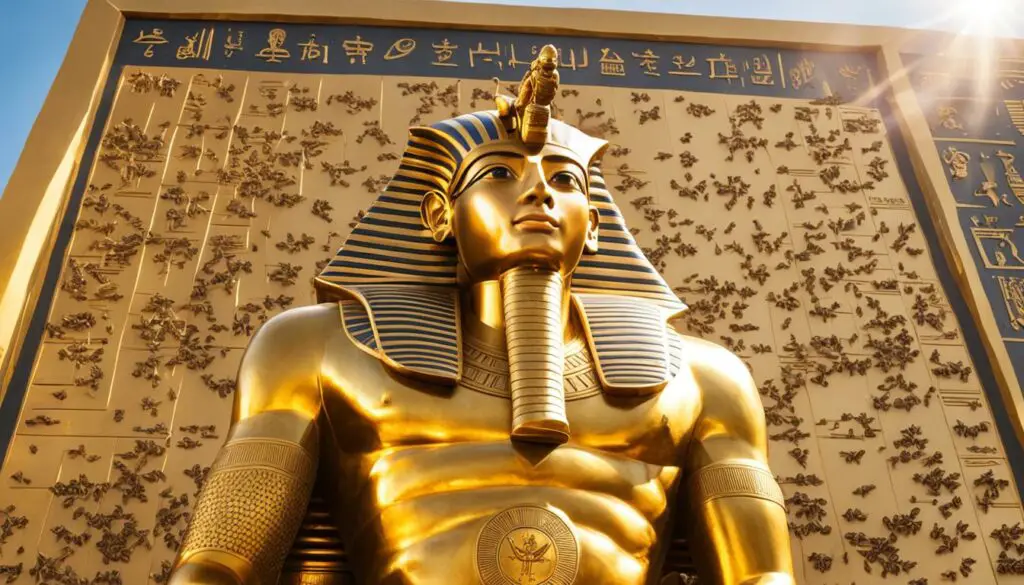
In ancient Egypt, bees held significant symbolism and mythological importance. They were associated with Lower Egypt and represented the giver of life, birth, death, and resurrection. According to Egyptian beliefs, the tears shed by Ra, the sun god, transformed into the first working bees, symbolizing their connection to the divine. Bees in flight were seen as messengers of Ra, delivering his divine messages to the people.
The bee’s significance in Egyptian culture extended beyond its association with Ra. It also represented the power and wisdom of the sun god and the cycle of life. The diligent and industrious nature of bees mirrored the sun’s consistent movement across the sky, reflecting the eternal cycle of life, death, and rebirth.
This profound symbolism of bees in ancient Egypt highlights their mythical and spiritual role in society, emphasizing their importance and revered status among the Egyptian people.
Fun Fact:
Bees were highly valued in ancient Egypt for their honey and beeswax, which were used for various purposes, including religious rituals, medicinal remedies, and embalming the deceased.
Bee Symbolism in Ancient Egypt
| Symbolism | Meaning |
|---|---|
| Giver of life | Bees were associated with the life-giving power of the sun god Ra. |
| Birth, death, and resurrection | Bees represented the cycles of life, death, and rebirth. |
| Messengers of Ra | Bees in flight were believed to carry divine messages from the sun god. |
| Power and wisdom | The bee symbolized the power and wisdom of Ra, reflecting the sun god’s influence. |
| Cycle of life | The diligent and industrious nature of bees mirrored the eternal cycle of life. |
As seen in the table above, bees embodied various aspects of ancient Egyptian beliefs and were regarded as sacred creatures, closely tied to the cosmic order and the divine.
Bees in Ancient Greece
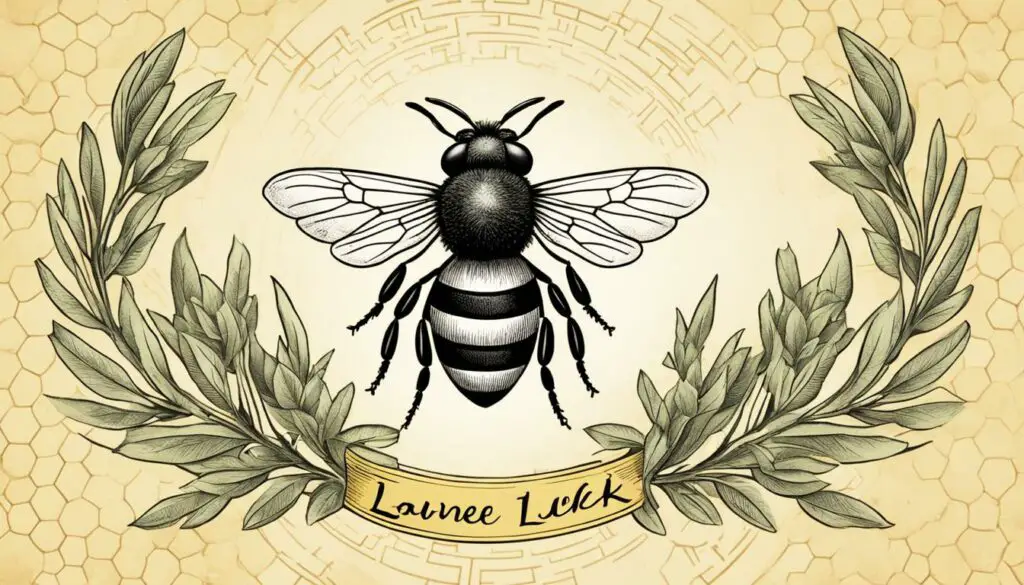
Bees held a strong connection to nymphs in ancient Greece, as they often inhabited the same spaces, such as caves and hollow tree trunks. Bees were associated with eloquence and songs, earning them the title of “birds of the Muses.” Goddesses such as Demeter, the goddess of agriculture, and Aphrodite, the goddess of love and beauty, were symbolically linked to bees and honeycombs. Bees were also connected to priestesses, and there was a belief that bees were the souls of priestesses who had served a goddess. The Greek name Melissa, meaning “queen bee,” further reinforces the association between bees and divine feminine figures. These connections highlight the role of bees as sacred and powerful creatures in Greek mythology.
Bees and Nymphs
In ancient Greece, bees and nymphs shared a close bond, often dwelling in the same natural habitats. These mystical nymphs, known for their beauty and connection to nature, were considered guardians and companions of bees. Together, they added a touch of enchantment to the Greek landscape.
Bee Connection to Goddesses
Greek goddesses were intricately linked to bees and their symbolism. Demeter, the goddess of agriculture and harvest, was associated with the fecundity and creativity represented by bees. The golden liquid of honey, produced by bees, mirrored the divine nectar that flowed through the veins of Aphrodite, the goddess of love and beauty. By embodying and personifying these goddesses, bees became a conduit for their powers and blessings.
Zeus and the Bees
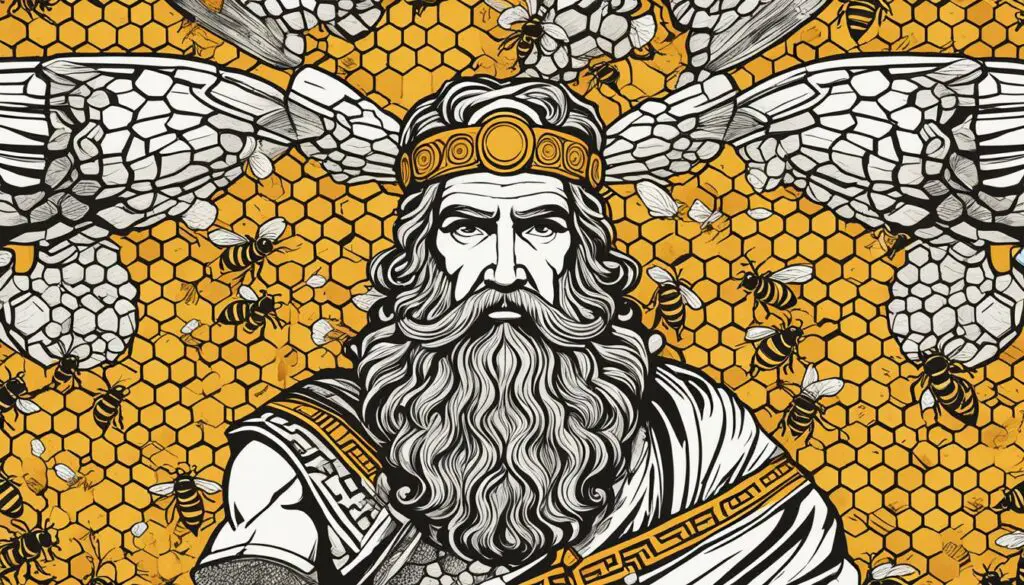
In Greek mythology, Zeus, the main god, had a strong connection to bees. In some stories, bees were essential to his survival, nourishing him with their honey. Zeus’s affinity for bees is reflected in his title “Melissaios,” meaning “Bee-man.” The story of a nymph named Melissa and her role in discovering the honeycomb further emphasizes the divine association with bees. There are also associations between bees and other gods, such as Othreis, who gave birth to a hero named Meliteus, founder of a town known as “Honey town.” Bees play a significant role in the mythology surrounding Zeus and other deities, highlighting their symbolic importance in Greek culture.
Zeus’s Connection to Bees
Zeus, the king of the Greek gods, had a special connection to bees in Greek mythology. In various stories, bees were crucial for his survival and well-being. They were believed to provide him with nourishment, specifically their honey. This connection is evident in the title “Melissaios,” which literally translates to “Bee-man,” given to Zeus.
“Melissaios”, a Greek title for Zeus, alludes to his close association with bees. It emphasizes the important role bees played in his life and underscores their symbolic significance in Greek culture.
The Story of Melissa and the Honeycomb
The tale of a nymph named Melissa further reinforces the divine association between Zeus and bees in Greek mythology. According to the legend, Melissa discovered the honeycomb, unlocking the knowledge of its sweet and valuable contents. This discovery symbolizes the connection between bees and wisdom in Greek culture.
The story of Melissa highlights the role of bees as messengers and bearers of knowledge. Bees, through their honeycomb, brought enlightenment and a sweet gift to humanity, solidifying their symbolic importance in Greek mythology.
Bees and Other Gods in Greek Mythology
Bees were not only linked to Zeus but also to other gods in Greek mythology. Othreis, a goddess associated with bees, gave birth to Meliteus, a hero who became the founder of a town known as “Honey town.” This association between bees and multiple deities further affirms their symbolic importance and their role in Greek culture.
The presence of bees in Greek mythology extends beyond their connection to Zeus. The association between bees and other gods highlights their significance and reinforces their role as symbols of divinity and the natural world.
Bees’ symbolism in Greek mythology and their connection to Zeus showcase their integral role in ancient Greek culture. Their impact goes beyond their honey production, representing wisdom, knowledge, and divine presence. As messengers of the gods and bearers of sweet gifts, bees embody the power and symbolism that continues to captivate and inspire.
Bees in Christianity

Christianity incorporates bee symbolism, particularly within monastic communities. Bees are seen as embodying virtues that are highly esteemed in monastic life, such as unselfishness, cleanliness, courage, sociability, wisdom, chastity, administrative skills, and spirituality.
In Christian beliefs, bees are connected to several saints, each with their own associations and patronages:
- Saint Ambrose: He is regarded as the patron saint of bees, beekeepers, candle makers, and wax refiners. Saint Ambrose is acclaimed for his preaching and defense of orthodox Catholicism.
- Saint Bernard of Clairvaux: This saint is revered as the patron saint of beekeepers and wax-melters. He served as an abbot and advisor to spiritual leaders, and he displayed profound devotion to the Virgin Mary.
- Saint Valentine: Known as the patron saint of beekeepers, love, and happy marriages, Saint Valentine is also associated with bees and their symbolism of eloquence.
Bees hold significant importance in Christian beliefs and practices, representing key virtues valued in religious contexts.
Bee Folklore and Superstitions
Bees have inspired various folklore and superstitions across different cultures. They are believed to bring good luck, prosperity, and wealth. For example, a bee landing on one’s hand is seen as a sign of imminent money, while a bee landing on the head signifies great success. Bees entering a home are considered a positive omen, and it is important to leave a window open for them to exit naturally to preserve their good luck.
Bees are believed to bring good fortune and should not be subjected to quarrels or foul language, as it may cause them to leave or sting. Informing the bees about important events in the household is believed to maintain their goodwill and prevent negative consequences.
In folklore, bees’ departure from a hive is seen as an omen of death, further establishing their connection to the cycle of life.
Honey and bee-related products have also been associated with healing properties in traditional remedies.
These folklore and superstitions highlight the significance of bees in everyday life and the belief in their positive influence and luck-bringing capabilities.
| Bee Superstitions | Description |
|---|---|
| Bee landing on hand | Sign of imminent money |
| Bee landing on head | Signifies great success |
| Bee entering a home | Positive omen of good luck |
| Informing the bees | Maintains their goodwill |
| Bees’ departure from a hive | Seen as an omen of death |
Conclusion
Bees have long been celebrated as symbols of good luck, prosperity, and fortune in folklore, mythology, and superstitions. Throughout history, these hardworking creatures have been associated with wisdom, love, fertility, and abundance. They are not just insects; they are messengers, bearers of knowledge, and emblems of industry.
From their connections to important deities, saints, and cultural traditions, bees have cemented their position as lucky charms. The folklore and superstitions surrounding bees serve as a testament to their positive influence and the belief in their ability to bring good fortune. Whether it’s their association with wealth, their role as messengers in mythology, or their spiritual significance in religious contexts, bees have captivated the imagination and garnered reverence from people worldwide.
So, the next time you encounter a buzzing bee, remember the potential for luck and prosperity it may carry. Appreciate the beauty and significance of these incredible creatures that have woven themselves into the fabric of human culture. With their presence, may good luck and fortune always find their way to you.
FAQ
Are bees considered symbols of good luck?
Yes, bees have long been regarded as symbols of good luck and fortune in various cultures.
What are some benefits of bees as a sign of luck?
Bees are associated with wealth and prosperity, and their presence is believed to attract abundance and success.
Are there any superstitions related to bees and good luck?
Yes, there are several superstitions surrounding bees, such as landing on certain body parts or entering a home, which are considered signs of good luck.
What is the relationship between bees and ancient Egyptian mythology?
In ancient Egypt, bees were associated with the sun god Ra and represented birth, death, and resurrection.
How were bees connected to ancient Greek mythology?
Bees had a strong connection to nymphs and were associated with eloquence and songs. They were also linked to goddesses such as Demeter and Aphrodite.
Did bees play a role in Greek mythology concerning Zeus?
Yes, bees were important to Zeus’s survival, and he was known as “Melissaios,” which means “Bee-man” in Greek.
Are there any connections between bees and Christianity?
Yes, bees are associated with virtues important in monastic life, and several saints, such as Saint Ambrose and Saint Valentine, are linked to bees.
What are some folklore and superstitions surrounding bees as symbols of good luck?
Bees landing on specific body parts, entering a home, or departing from a hive are all believed to bring good luck. Foul language or quarreling near bees is thought to bring bad luck.
What can be concluded about the relationship between bees and good luck?
Bees have a long-standing association with good luck and fortune in various cultures, as evidenced by their symbolism, mythology, superstitions, and folklore.
